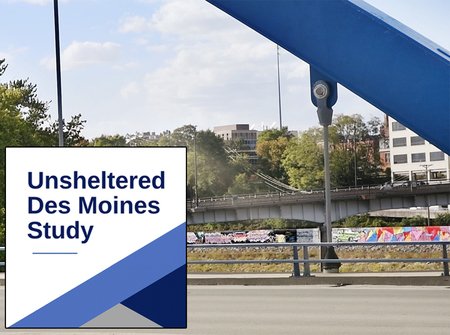The Unsheltered Study
Giving Voice to the Unsheltered and Examining the Findings of the Unsheltered Study
By: Cynthia Latcham, Executive Director of Anawim Housing
Introduction: "The Unsheltered Study" was a collaboration between Anawim Housing, Homeward, and Primary Health Care, and was conducted by a research team with Drake University, led by Dr. Elizabeth Talbert from the Department of Culture and Society. The study was commissioned to better understand the experiences of people living unsheltered in Polk County. It included 157 surveys of persons experiencing homelessness living unsheltered in Polk County and 37 in-depth interviews of the same population between June and October 2022. The results of the study were released in January 2023, known as "The Unsheltered Des Moines Study".
Anawim Housing is proud to have been a community partner of the Polk County Unsheltered Study. The study was a collaboration by Homeward, community stakeholders and funders, and Drake University who partnered together to survey people living unsheltered in our community. The group hoped to gain a better understanding of the struggles people face and to collect both qualitative and quantitative data that would inform community and systems policies that impact the unsheltered population.
The stakes are high for people who live unsheltered. Extreme weather, safety, meeting basic needs of hydration and food all contribute to potentially deadly outcomes. Given how hard it is to live outside, our community needed to ask people living in those circumstances why they would continue to stay unsheltered when emergency shelter was available to them. It is a best practice to solicit feedback from customers in any line of business. Focus groups, product testing, and analysis of the customer experience is standard in the for-profit sector. Affording that same opportunity for people living unsheltered is critical to finding solutions.
What We Know:
We know it is hard to live unsheltered. And the study results bore that out. We know it’s hard to live in a communal living setting, such as emergency shelter. The people who are living unsheltered told us this. We also know it is incredibly hard to operate an emergency shelter. Dedicated people work in the field and face daily challenges that most of us will never experience. But the study gives our community recommendations and potential solutions that both people who are living unsheltered want and are supported by an extensive literature search on the topic. None of the recommendations will be easy to implement and all will require multi-system and agency cooperation.
Important Findings:
People who are living outside overwhelmingly said they want their own place to live. With a door that locks. In fact, of the 152 people surveyed, only two indicated they wanted to continue living in a tent. They want to avoid chaos and the people they perceive to be part of that chaos. They want help and access to more resources. They want to be safe. They want to be treated with dignity and respect and they want clarity on rules and expectations.
Permanent Supportive Housing operating under the Housing First model is the proven best method for serving people who have lived unsheltered. Program managers work with people referred through Centralized Intake to move immediately into housing. We lower barriers to housing and then tailor our services to support people's ability to remain housed. We place great value on partnering with the individual to achieve their goals. We develop trusting relationships and model healthy boundaries rooted in trauma informed care and other evidence based practices. The progress made is rarely easy or linear. It requires deep commitment, specialized skills and ongoing enthusiasm. Teamwork and community buy-in is essential.
In Summary:
Just because a person is living outdoors does not mean that they prefer outside over permanent housing. By giving voice and asking what people would need in order to serve them better will allow us all to be better informed. Healthy communities ensure all of its citizens have safe and stable housing. Addressing homelessness will require a coordinated multi-system approach utilizing the skills and resources of many stakeholders. Our whole community will benefit as a result. When we all do better, we ALL do better.
Important Links:
The Unsheltered Study: Click to read the summary or the complete study results on Homeward's website
Des Moines Register Article: "Why do some Des Moines homeless people avoid shelter? A new study finds out, plus other takeaways".
We Are Iowa - Channel 5 News: "New Study Identifies Barriers For Homeless Iowans Finding Shelter in the Metro"
Channel 13 News: "Study Offers Guidance on How to Help Des Moines' Homeless Population"


